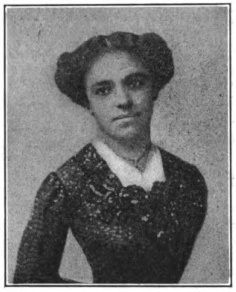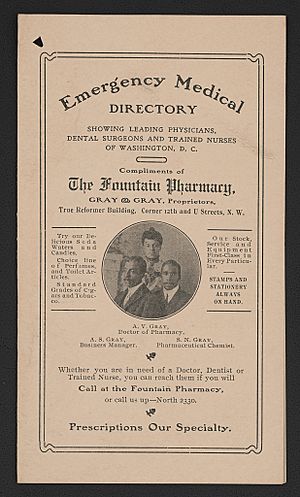Amanda Gray Hilyer facts for kids
Quick facts for kids
Amanda Gray Hilyer
|
|
|---|---|

Pictured in the Pharmaceutical Era, 1912
|
|
| Born |
Amanda Victoria Brown
24 March 1870 |
| Died | 29 June 1957 |
| Resting place | Columbian Harmony Cemetery |
| Alma mater | Howard University |
| Occupation | Entrepreneur, pharmacist, civic worker, civil rights activist |
| Organization | NAACP, Phillis Wheatley YWCA, National Medical Association |
| Known for | Being the first African American woman to own and operate a pharmacy in Washington D.C. |
| Spouse(s) | Arthur S Gray (1893-1917); Andrew F. Hilyer (1923-1925) |
Amanda Gray Hilyer (born March 24, 1870 – died June 29, 1957) was an amazing African American woman. She was an entrepreneur, which means she started her own businesses. She was also a pharmacist, a community helper, and a civil rights activist. She made history as the first Black woman to own and run a pharmacy in Washington D.C.
Contents
Amanda's Early Life
Amanda Victoria Brown was born in Atchison, Kansas on March 24, 1870. She went to public schools in Kansas. In 1893, when she was 23, she married Arthur S. Gray. He was also a pharmacist.
Around 1897, Amanda and Arthur moved to Washington D.C.. Amanda then went to Howard University. She earned her degree in pharmacy in 1903.
Working in Washington D.C.
Amanda first worked as a pharmacist at the Woman's Clinic in Washington. Then, in 1905, she teamed up with her husband, Arthur. Together, they opened their own business called the Fountain Pharmacy.
Their pharmacy was located at 12th and U Streets NW. This area was a busy center for Black businesses. Amanda and Arthur became important members of Washington's Black community. Their pharmacy was described as a "large, bright, airy, well-equipped store." It even had a post office branch and a telegraph office!
Community Involvement
Amanda and Arthur were very active in their community. They joined many social, civic, and professional groups. These included the National Medical Association and the NAACP. The NAACP is a group that works for civil rights.
Amanda was also a secretary for the Treble Clef Club. She was a member of the Booklovers Club too. She helped start the Phillis Wheatley Young Women's Christian Association (YWCA) in Washington. In 1905, she became its first recording secretary.
Life After Arthur
In 1917, Arthur passed away at age 48. Amanda then closed the pharmacy they had run together. She joined the efforts for World War I. She became a director for the YWCA camps. These camps hosted Black soldiers.
Later, Amanda became the President of the Phillis Wheatley YWCA. She held this important position for three years.
In 1923, Amanda married Andrew Franklin Hilyer. He was a lawyer, author, and civil rights leader. Andrew had been born enslaved. He and his first wife, Mamie, knew Amanda and Arthur well. They were all active in similar community groups. Andrew F. Hilyer passed away in 1925, after only two years of marriage to Amanda.
Continuing Her Work
After 1925, Amanda Hilyer kept up her important community work. She was involved in many organizations.
- She was a lifetime member of the Association for the Study of African American Life and History. This group studies Black history.
- She was President and a board member of the Ionia R. Whipper Home for Unwed Mothers.
- She was a member of the Citizens Committee for Freedmen's Hospital Nurses.
- She was part of the National Association of Colored Graduate Nurses.
- She was President of the Alumni Association at Howard University.
- She was a member of the Inter-Racial Committee of the District of Columbia. This committee was started by the NAACP, where she was also a lifetime member.
- She helped to save the Frederick Douglass House in Anacostia.
Her Legacy
Amanda Gray Hilyer passed away at home on June 29, 1957. She was 87 years old. She left money to several organizations. These included the Berean Baptist Church, the Ionia Whipper Home, and Howard University. She also gave money to the Phillis Wheatley YWCA and Stoddard Baptist Home.
She was buried in Columbian Harmony Cemetery next to her first husband. People remembered her as a woman who "dedicated her life to the educational, social, and moral uplift of black people." She especially helped those in Washington D.C.
 | William M. Jackson |
 | Juan E. Gilbert |
 | Neil deGrasse Tyson |


